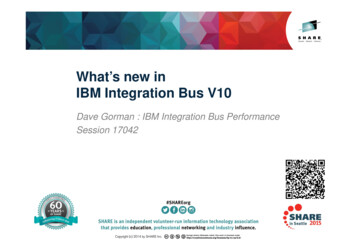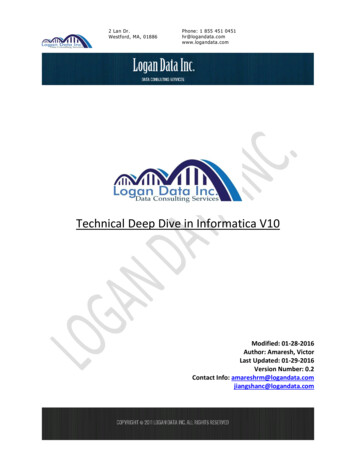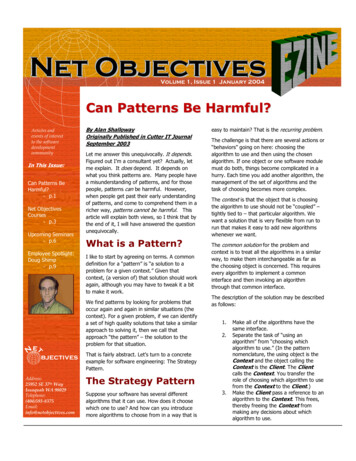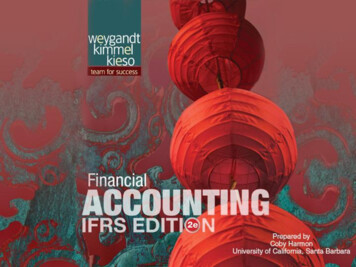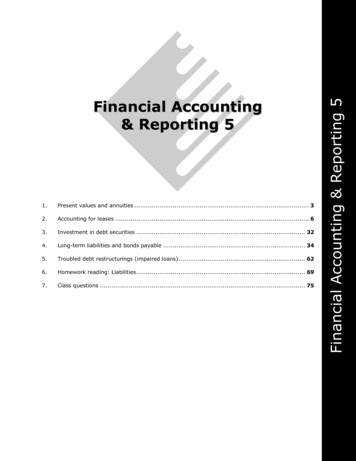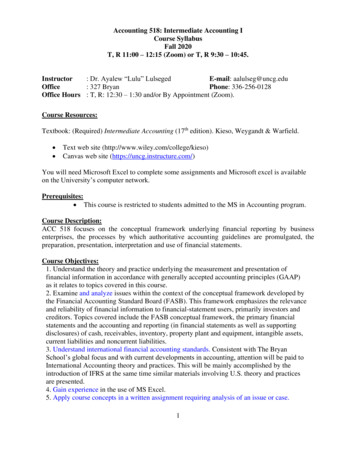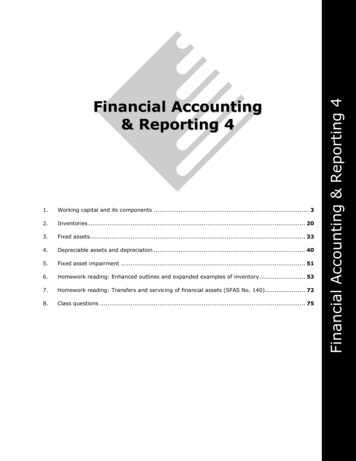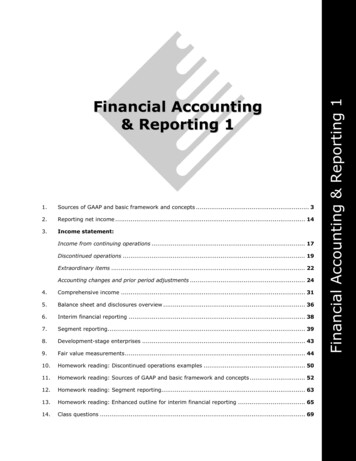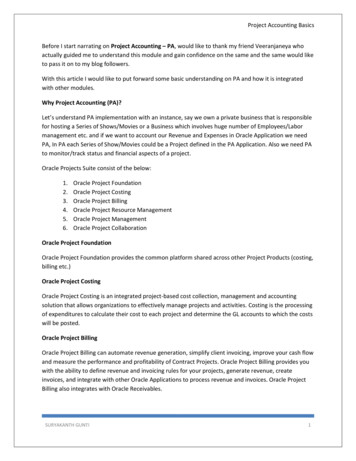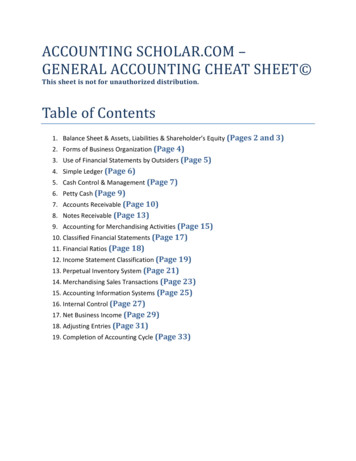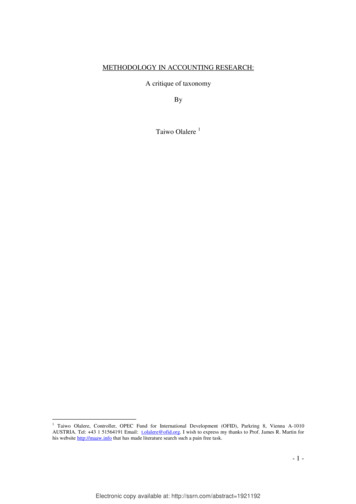
Transcription
METHODOLOGY IN ACCOUNTING RESEARCH:A critique of taxonomyByTaiwo Olalere 11Taiwo Olalere, Controller, OPEC Fund for International Development (OFID), Parkring 8, Vienna A-1010AUSTRIA. Tel: 43 1 51564191 Email: t.olalere@ofid.org. I wish to express my thanks to Prof. James R. Martin forhis website http://maaw.info that has made literature search such a pain free task.-1-Electronic copy available at: http://ssrn.com/abstract 1921192
METHODOLOGY IN ACCOUNTING RESEARCH:A critique of taxonomyABSTRACT: In this paper, I argue that the current taxonomy of methodology inaccounting research is conceptually inadequate. Drawing from the social sciences, ofwhich accounting is a part, I propose a classification scheme to address this problem. Thecentral theme of this framework is that methodology is not just a single decision in theresearch process but a series of decisions at the level research purpose, strategy, methodand paradigm. My contention is that methodology surveys, several of them recentlyreleased will be more fruitful if undertaken at each of these methodology decision levelsi.e. strategy should be compared with strategy, method with method and paradigm withparadigm. In essence, a classification scheme that compares (say) an archival or surveymethod with an experiment is inconsistent with this framework. The framework alsopoints to the need for researchers not only to be aware of but also to be open mindedabout the diverse methodologies for conducting and evaluating accounting research aswell as their strengths and limitations. Ultimately, the selection of research methodologyshould be driven primarily by the research question: a theory-testing research requires atheory-testing methodology, a theory-generating research requires and theory-generatingmethodology.Key words: empirical research, method and methodology, research design, researchmethodology, research model, taxonomy of methodology.-2-Electronic copy available at: http://ssrn.com/abstract 1921192
METHODOLOGY IN ACCOUNTING RESEARCH:A critique of taxonomyOverturning the null leads to fameWhere empirical work is the game.But classes of suchWon't be worth very muchIf taxonomy's viewed with disdain.- Johnson (1972: 64)1.INTRODUCTIONA number of academics have devoted substantial time and effort to surveying trends inresearch methodology in the field of accounting. For example, Oler et al (2010) examinedarticles published in nine accounting journals, some of them as old as 48 years, andassigned them one by one to different categories of “methodology”. This is consistentwith the methodical ways of accountants. It is in the nature of accountants to want tomonitor trends - trends in key accounting ratios, trends in budget performance, trends inresearch methodology etc. Through a survey, we can know which methodology is invogue and we can then proceed to analyze its contributions to our knowledge relative toothers. Coyne et al (2010), Stephens et al (2011) and Pickerd et al (2011) have alsorecently ranked accounting faculty and research programs by topic and methodologyusing methodology surveys. As laudable as these efforts are, one is surprised about the-3-
lack of debate among accounting academics as to whether the existing taxonomycorrectly represents the logic of what they do in their research endeavours.A key finding from various surveys that is corroborated by journal editors’ annual reportsand which for quite some time has been generating ripples within the academic arm of theprofession, is that accounting research is dominated by the archival/statistical“methodology” (Searcy & Mentzer 2003; Lukka & Kasanen 1996; Kachelmeier 2009;Bouillon and Ravenscroft 2010; Coyne et al 2010; Oler et al 2010; Stephens et al 2011).Oler et al (2010) suggest that, while the adoption of the archival2 “methodology” hasgrown significantly over decades, from the 1960s to the 2000s, the use of other“methodologies”, such as experiment, field study and survey have declined. Themethodology surveys have tended to focus on top academic journals in accounting withhigh Social Science Citation Index (SSCI); hence the classifications may be taken as themainstream view in academic accounting. Nevertheless, several questions remainunanswered regarding the conceptual basis for comparing (say) archival or statistical‘methodology’ with laboratory experiment and survey ‘methodology’ with field studies.Are experimenters precluded from using archival data? Is statistics not a tool foranalysing experimental data? If we claim that field studies are underrepresented injournal publications and we separate survey from field research, where else do we look toas the probable reason for this underrepresentation? Is survey not an instrument forcollecting data in field research?2The word ‘archival’ is used in the methodology surveys to mean numerical data obtained from data repositories (Oleret al 2010; Coyne et al 2010; Stephens et al 2010) as well as “studies in which the researchers, or another third party,collected the research data and in which the data have objective amounts such as net income, sales, fees, etc” (Coyne etal 2010: 634). Archival research has also been referred to as capital market research (Kachelmeier 2009; Oler et al2010; Bouillon & Ravenscroft 2010). The definitions thus exclude biographical work in accounting (e.g. Whittington &Zeff 2001) and similar writings in the journals of accounting history which rely almost exclusive on textual archives.-4-
Criticisms range from accounting research being labeled as monolingual in a multilingualworld (Chua 1996) to being described as intolerant of other perspectives, irresponsive tothe needs of practicing accountants and having little impact on related fields (Reiter &Williams 2002). According to Chua (1996), although the language of numbers asreflected in the empirical/calculative tradition is extremely powerful at overcomingcultural and linguistic boundaries, it is inherently capable of decontexualising the sociocultural and political aspects of the debates represented by these numbers whenexclusively or improperly used. Its dominance in accounting graduate education, sheargues is due to “(i) the power of inscriptions, (ii) contradictions in post-modernity, and(iii) the perceived ‘success’ of allied professionals” (Chua 1996: 129). Reiter & Williams(2002) measured impact in terms of the extent to which empirical research as publishedin top accounting journals is cited in top journals of finance and economics. Based ontheir analysis of 553 articles published in 1990-91, they found that “economics cites itselfmost, then finance to a very modest extent and accounting virtually not at all” (Reiter &Williams 2002: 588). In other words, accounting imports more than it exports theoriesand this, the authors attribute to the parochial approach to the question of methodology inaccounting research.Also, Arnold (2009) has attributed the failure of accounting academics to anticipate therecent global financial crisis, a crisis partly linked to fair value accounting and thattriggered capital adequacy issues among financial institutions, to the over-emphasis onthe archival “methodology”, in that the mass of off-balance transactions that fuelled thecrisis was not archived in any publicly available database. Arnold has found support inKaplan (2011) who criticized his academic colleagues for spending so much time-5-
investigating how fair value impact on capital market without understanding how fairvalue is determined. Kaplan was actually speaking in the context of theunderrepresentation of field research in accounting journal publications.The discussion so far has thrown up three important issues. The first is the conceptualinadequacy of the current taxonomy of research methodology. The second is theperceived narrowness of methodology in accounting research. Critics insist thatmainstream accounting research has focused almost exclusively on the archivalmethodology. But, is there in the real sense something called archival methodology? Andif there is, what are its distinctive evaluative criteria? The third issue is the perceivedirrelevance of accounting research or doubts about the usefulness of such research to thepractical accounting problems. Although this paper focuses primarily on taxonomy, thethree problems are interrelated. The rest of the paper is divided into four parts. In part 2, Idiscuss the nature and forms of research. In part 3, I explain certain basic terms andconcepts in research methodology and then present the current classifications ofmethodology in accounting research. Finally, in part 4, I propose a framework forclassifying empirical methodologies in accounting research.2.NATURE AND FORMS OF RESEARCHWhat is research? Why research? And what forms of research do researchers undertake?These questions are important because there is the continuing tendency to confuse formsof research with research methodology. Secondly, the selection of research methodologyis to a great extent determined by the form and purpose of research. Thirdly, these-6-
questions are at the centre of the controversy surrounding the perceived irrelevance ofaccounting research to the practical problems faced by accountants. Miller (1977: 46)argues that it is the perception of accounting research as a monolithic activity “in itsthrust, methodology and impact” – “pressing toward a single well-defined and mutuallyaccepted goal” - that fuels the unreasonable expectation from researchers. This feeling ofcrisis is however not restricted to accounting, for one expert in the field of organizationalscience had also observed that as “research methods and techniques have become moresophisticated, they have also become increasingly less useful for solving the practicalproblems that members of organizations face” (Susman and Evered 1978: 582). Yetresearch projects defer in terms of their approach, the immediacy of their impact onaccounting practice, their appeal to academics and practitioners and their channels ofpublication.Research according to Kinney (1986: 339) is “the development and testing of newtheories of 'how the world works' or refutation of widely held existing theories”. It is a“careful or diligent search; studious inquiry or examination; especially: investigation orexperimentation aimed at the discovery and interpretation of facts, revision of acceptedtheories or laws in the light of new facts, or practical application of such new or revisedtheories or laws” (Merriam-Webster online dictionary). These two definitions reveal thatresearch, including accounting research is (i) both an activity and a process (ii) based onpure logic or examination of facts/data; and (ii) aimed at generating new theories,refuting or revising existing theories and practical application of theories. In essence the-7-
central aim of research is “theory”3(Zimmerman 2001). Empirical research seeks tounderstand and explain natural phenomena by collecting and analyzing data or facts. Thefruit of empirical research is empirical theory but empirical science theory emerges onlyfrom empirical science4 research. An empirical research is a scientific research if andonly if it fulfils the canons of scientific inquiry5. In accounting literature, the term“empirical research” is sometimes narrowly conceptualized as the application ofstatistical/mathematical techniques to test theories, based on numerical data6.Miller (1977) suggests a classification accounting research into three forms: basic,applied and usable research. A basic or pure research is an empirical or non-empiricalresearch carried out without any specific practical use in view. It does not have to solveany practical problems but only needs to “(i) discover a new problem or (ii) develop anew theoretical approach to solve previously known problems” (Miller 1977: 44). An3Theories are conjectures, expressed in words or in mathematical terms that help in understanding, explaining andpredicting natural phenomena. They are “nets cast to catch what we call ‘the world’: to rationalise, to explain and tomaster it” (Popper, 1959: 37-38).4It is difficult to define precisely what science is, except by reference to its goal (Popper 1959; Kerlinger & Lee 2000).The goal of science according to Popper (1965) is to formulate and test hypothesis. He uses the term ‘falsification’rather than ‘verification’ to distinguish between empirical and logical sciences. A theory of logical science,mathematics for example can be verified or proved quod erat demonstrandum (Q.E.D) within itself and withoutreference to the external world but it cannot be empirically falsified. Popper specifies three criteria that an empiricalscience theory must satisfy. First, it must be synthetic, meaning that it must express some general laws. Second, it mustnot be metaphysical i.e. it must represent a natural phenomenon. Third, it must be testable.5These canons of scientific inquiry are the core of Kerlinger & Lee’s (2000: 14) conception of science as a “systematic,controlled, empirical, amoral, public and critical investigation of natural phenomena guided by theory andhypothesis about the presumed relations among such phenomena”. It is systematic and controlled because it is ordered,disciplined, rigorous and designed in such a way as to eliminate alternative explanations [The word ‘rigorous’ is usedhere not in the context of mathematical and statistical techniques but in terms of what Largay (2001: 71) referred to as“thoughtful, well-articulated arguments and logic, and appropriately designed examples, experiments and tests”]. It isamoral because the conclusion is judged by its reliability and validity not by the personal beliefs and values of theresearcher. It is public and critical because it has to be peer reviewed to gain the respect of the scientific community.6For example, in their survey of methodology in accounting research, Lukka and Kasanem (1996: 759) adopted adefinition of empirical research as one that is “explicitly based on primary non-literary data collected for the study inquestion, covering market-based analyses, questionnaire surveys, case and field studies and laboratory experiments ”.-8-
applied research tests solutions to problems and generates theory from current practices,with a view to eventually solving practical problems, though the impact on practice maynot be immediate. The third category described as “usable” or “practical” research doesnot involve expanding or testing knowledge but rather it identifies and disseminatesinformation from basic and applied research that is of immediate value to accountingpractice. This classification of accounting research not only broadens the definition ofresearch and expectations from researchers, it also has implications on the design andevaluation of research. It further suggests that all policy initiatives to encourageaccounting practitioners to read and transfer research findings to practice (Leisenring &Todd, 1994; Gordon & Porter 2009) should proceed from the premise that some researchpublications are not intended for practitioners in the short or medium term horizon.A form of applied research is action research (Avison et al 1999). The term “actionresearch” was coined by Kurt Lewin to describe a form of research involvingcollaboration between social scientists and practitioners in an attempt to understand asocial problem, in his own case the problem of minorities in the United States. Theconcept has subsequently been expanded in various disciplines (see for example Susman& Evered 1978 and Kaplan 1998). The purpose of action research is both to generatetheory and to diagnose and proffer solutions to the specific problems of organizations. Insuch a situation “research that produces nothing but books will not suffice” (Lewin1946:35). In accounting, action research often takes the form of academics, consulting fororganizations. In Liu and Pan (2007), a study described as action research, the researcherconsultants successfully developed an Activity-Based Costing (ABC) system for a largeChinese manufacturing company but no explicit theory was tested or generated.-9-
Baskerville (1999: 13) attempts to draw a distinction between consultancy and actionresearch by stating that “consultants are usually paid to dictate experienced, reliablesolutions based on their independent review” and that “action researchers act out ofscientific interest to help the organization itself to learn by formulating a series ofexperimental solutions based on an evolving, untested theory”. Kaplan (1998) howeverargues in favor of some kind of compensation if action researchers are to be takenseriously by the organizations they are engaged with. Nevertheless, this line of distinctionis rather blurred and the question of objectivity in the research process remains an openone, as it is with all participatory forms of research. As Blum (1955: 4) pointed out ratherbluntly “the main objection which the action researcher has to meet squarely is that heconfuses his role as a scientist with his role as a human, social, political and ultimately areligious being, that he ceases to do objective research as he becomes entangled with theworld of values”. Furthermore, organizations have distinct objectives that they are set upto accomplish, which are not necessarily synchronous with the scientific pursuit of actionresearchers.In the field of accounting, phrases such as ‘positive research’7, ‘capital market research’and ‘behavioral research’ are used to describe forms of research (See for example Oler etal, 2010). The term “positive” or “positivism” originated from philosophy and had beenused in economics since Friedman (1953) cited in Kothari (2001) and Christenson (1983).Watts & Zimmerman (1990) use the term “Positive” as a ‘label’ or ‘trademark’ to7In their paper, Oler et al (2010: 636) classify “archival, experimental, and field study methodologies” as examples ofpositive research.- 10 -
identify a form research that focuses on explaining and predicting accounting practice, asdistinct from normative research that is prescriptive. Capital market and behavioralaccounting research are two of the branches of positive research. Capital market researchdraws on microeconomic models to test hypotheses about the reaction of securitiesmarkets to the release of accounting information (Kothari 2001). Behavioral researchstudies the behavior of accountants and how non-accountants are influenced byaccounting information (Hofstedt & Kinard 1970). Another branch of positive research isagency theory research which studies the problem of information asymmetry and moralhazard in a principal-agent relationship using the economic theory of contracting. Ineconomics, contracting theory dates back to Coase (1937).A further way of looking at forms of research is through the academic / practitioner lens(Boehm 1980). The distinction between the two is neither about whether the researcher isan academic or a practitioner nor about whether the research is basic, applied or usable; itis about the research model. In other words, academics can undertake usable/practicalresearch just in the same way as practitioners can undertake basic research. Boehm(1980) states that academic research is distinguished by its traditional, structured, naturalscience model (Appendix Figure 1). It starts by the researcher selecting an area forinvestigation, reviewing previous studies in the area and using theory from within oroutside the field to formulate testable propositions/hypotheses. The researcher thenproceeds to design the study, execute the design and analyze the results, ending in aconfirmation or rejection of hypothesis. If the hypothesis is confirmed, it remains sotentatively. If the hypothesis is falsified, the researcher develops alternative explanationsthat may require further analysis or reformulation of the hypothesis.- 11 -
The practitioner research mod
accounting research to the practical problems faced by accountants. Miller (1977: 46) argues that it is the perception of accounting research as a monolithic activity “in its thrust, methodology and impact” – “pressing toward a single well-defined and mutually accepted goal” - that fuels the unreasonable expectation from researchers.
